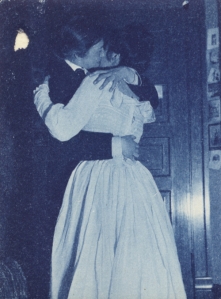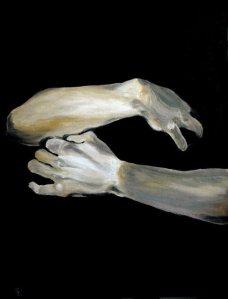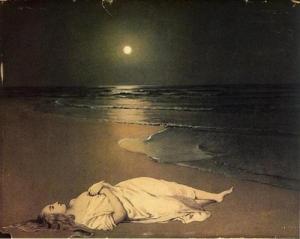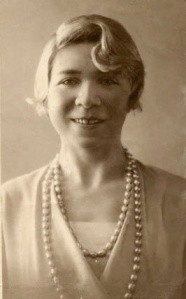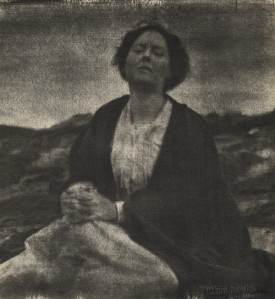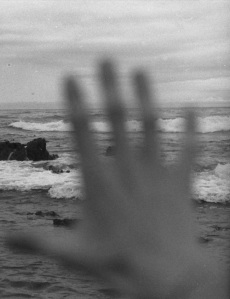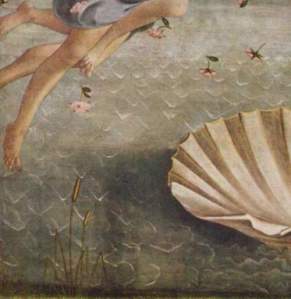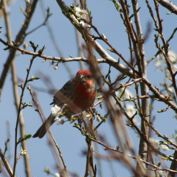El Nudo
Su idilio fue una larga sonrisa a cuatro labios…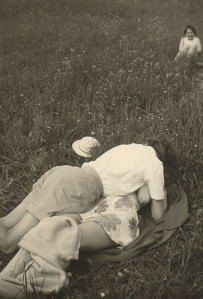
En el regazo cálido de rubia primavera
Amáronse talmente que entre sus dedos sabios
Palpitó la divina forma de la Quimera.
En los palacios fúlgidos de las tardes en calma
Hablábanse un lenguaje sentido como un lloro,
Y se besaban hondo hasta morderse el alma!…
Las horas deshojáronse como flores de oro,
Y el Destino interpuso sus dos manos heladas…
Ah! los cuerpos cedieron, mas las almas trenzadas
Son el más intrincado nudo que nunca fue…
En lucha con sus locos enredos sobrehumanos
Las Furias de la vida se rompieron las manos
Y fatigó sus dedos supremos Ananké…
Delmira Agustini
Los cantos de la mañana, 1910
The Knot
Their idyll was a smile of four lips… 
In the warm lap of blond spring
They loved such that between their wise fingers
the divine form of Chimera trembled.
In the glimmering palaces of quiet afternoons
They spoke in a language heartfelt as weeping,
And they kissed each other deeply, biting the soul!
The hours fluttered away like petals of gold,

Then Fate interposed its two icy hands…
Ah! the bodies yielded, but tangled souls
Are the most intricate knot that never unfolds…
In strife with its mad superhuman entanglements,
Life’s Furies rent their coupled hands
And wearied your powerful fingers, Ananké*…
*Ananke: Goddess of Unalterable Necessity
Translation Valerie Martínez
Al Claro de Luna
La luna es pálida y triste, la luna es exangüe y yerta. 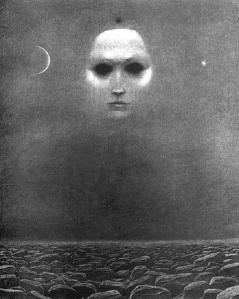
La media luna figúraseme un suave perfil de muerta…
Yo que prefiero a la insigne palidez encarecida
De todas las perlas árabes, la rosa recién abierta,
En un rincón del terruño con el color de la vida,
Adoro esa luna pálida, adoro esa faz de muerta!
Y en el altar de las noches, como una flor encendida
Y ebria de extraños perfumes, mi alma la inciensa rendida.
Yo sé de labios marchitos en la blasfemia y el vino,
Que besan tras de la orgia sus huellas en el camino;
Locos que mueren besando su imagen en lagos yertos…
Porque ella es luz de inocencia, porque a esa luz misteriosa
Alumbran las cosas blancas, se ponen blancas las cosas,
Y hasta las almas más negras toman clarores inciertos!
Delmira Agustini
El libro blanco, 1907
In the Light of the Moon
The moon is pallid and sad, the moon is bloodless and cold.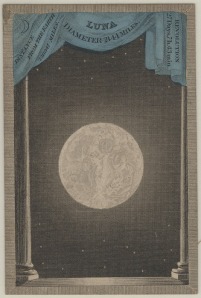
I imagine the half-moon as a profile of the dead…
And beyond the renowned and praised pallor
Of Arab pearls, I prefer the rose in recent bud.
In a corner of this land with the colors of earth,
I adore this pale moon, I adore this death mask!
And at the altar of the night, like a flower inflamed,
Inebriated by strange perfumes, my soul resigns.
I know of lips withered with blasphemy and wine;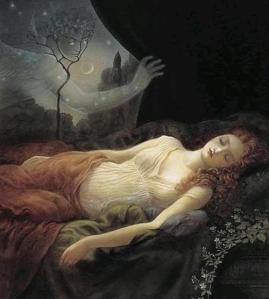
After an orgy they kiss her trace in the lane.
Insane ones who die kissing her image in lakes…
Because she is light of innocence, because white things
Illuminate her mysterious light, things taking on white,
And even the blackest souls become uncertainly bright.
Translation Valerie Martínez
Palabras a Delmira Agustini
Estás muerta y tu cuerpo, bajo uruguayo manto,
Descansa de su fuego, se limpia de su llama.
Sólo desde tus libros tu roja lengua llama
Como cuando vivías, al amor y al encanto.
Hoy, si un alma de tantas, sentenciosa y oscura,
Con palabras pesadas va a sangrarte el oído,
Encogida en tu pobre cajoncito roído
No puedes contestarle desde tu sepultura.
Pero sobre tu pecho, para siempre deshecho,
Comprensivo vigila, todavía, mi pecho,
Y, si ofendida lloras por tus cuencas abiertas,
Tus lágrimas heladas, con mano tan liviana
Que más que mano amiga parece mano hermana,
Te enjugo dulcemente las tristes cuencas muertas.
Alfonsina Storni
Words to Delmira Augustini
You are dead and your body under an Uruguayan mantle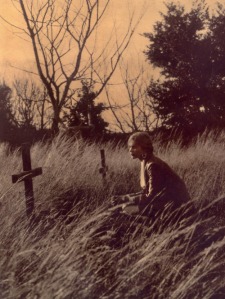
Rests from its fire, cleansed of its soul
Since now solely from your books does your red tongue call
As when you lived, to love, and to enchant.
If today, a soul among the many judgmental and dark
Comes to bleed your ear with ponderous words
Huddled in your poor crumbling little casket
You cannot answer it, from your grave.
But upon your breast, undone forever 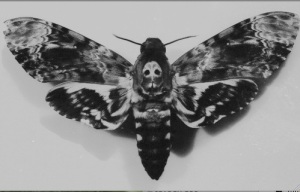
My breast ever keeps tender vigil
And if offended your empty sockets should weep
Your frozen tears such a delicate hand.
A hand more than that of a friend, but the hand of a sweetheart*
Will wipe them sweetly away from the sad dead hollows.
*The word hermana used here indicates a relationship deeper than friends but not quite that of lovers.
Translation Dia Tsung
Alfonsina y el mar
Por la blanda arena que lame el mar
su pequeña huella no vuelve más,
un sendero solo de pena y silencio
llegó hasta el agua profunda,
un sendero solo de penas mudas
llegó hasta la espuma.
Sabe Dios qué angustia te acompañó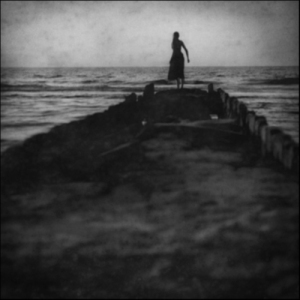
qué dolores viejos calló tu voz,
para recostarte arrullada en el canto
de las caracolas marinas
la canción que canta,
en el fondo oscuro del mar, la caracola.
Te vas Alfonsina con tu soledad
qué poemas nuevos fuiste a buscar,
una voz antigua de viento y de sal,
te requiebra el alma y la está llevando,
y te vas hacia allá como en sueños,
dormida Alfonsina, vestida de mar.
Cinco sirenitas te llevarán
por caminos de algas y de coral,
y fosforescentes caballos marinos
harán una ronda a tu lado,
y los habitantes del agua
van a jugar pronto a tu lado.
Bájame la lámpara un poco más
déjame que duerma, nodriza en paz,
y si llama él no le digas que estoy
dile que Alfonsina no vuelve
y si llama él no le digas nunca que estoy,
di que me he ido.
Te vas Alfonsina con tu soledad 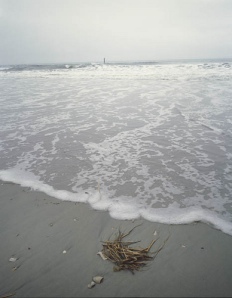
qué poemas nuevos fuiste a buscar,
una voz antigua de viento y de sal
que requiebra el alma y la está llevando,
y te vas hacia allá, como en sueños,
dormida Alfonsina, vestida de mar.
Félix Luna lyrics
Ariel Ramírez music
Alfonsina and the Sea
To the soft sand which is lapped by the sea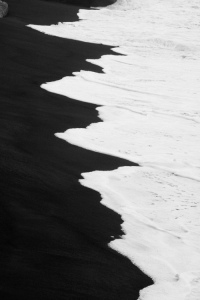
your little footprint return no more,
only a path, a trail of pain and silence
reaching up to the deep water,
only a path of silent torment
reaching up to the foam.
God knows what anguish accompanied you
What ancient suffering silenced your voice,
to lean back, lulled in the song
of the seashells
the song which they sing
on the deep darkness of the sea, the conch.
You went, Alfonsina with your solitude
To find what new poems are left to be found,
An ancient voice of the wind and the salt,
to shatter your soul and convey you,
and you go yonder as in dreams,
Alfonsina asleep, adorned with the sea.
Five little sirens will bear you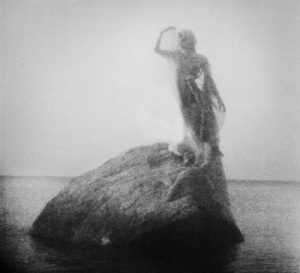
on paths of algæ and coral
and phosphorescent sea horses
encircle your side,
and the inhabitants of the water
soon come to sport beside you
Lower the lamp for me, slightly
Let me sleep, o nurse, in peace
and if he calls, tell him I’m not here
tell him Alfonsina will not return
And if he calls, tell him nothing about me
simply say I have gone away.
You went, Alfonsina with your solitude
To find what new poems are left to be found,
An ancient voice of the wind and the salt,
to shatter your soul and convey you,
and you go yonder as in dreams,
Alfonsina asleep, adorned with the sea.
Translation Dia Tsung
Alfonsina y el mar, sung by Mercedes Sosa
These ripples of remembrance and commemoration, are tributes which spread out from the life of Delmira Agustini, an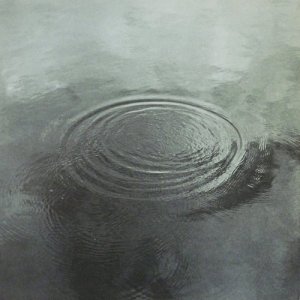 Uruguayan poet of Italian descent, who was murdered by her husband Enrique Reyes, a month after she had divorced him. Agustini had been married to Reyes for a month when the divorce was granted.
Uruguayan poet of Italian descent, who was murdered by her husband Enrique Reyes, a month after she had divorced him. Agustini had been married to Reyes for a month when the divorce was granted.
Agustini was emphatically a modern poet, who asserted her female voice in a time and place when women were not supposed to publicly assert either themselves or their work. Her poems were powerful, personal and lyrical, and brought her both fame and notoriety. Fortunately many of her poems, together with English translations, can be found on the web, and they are well worth finding and reading. This is a list of her published work.
1907: El libro blanco
1910: Cantos de la mañana
1913: Los cálices vacíos, pórtico de Rubén Darío
1924: Obras completas “Complete Works”: Volume 1, El rosario de Eros; Volume 2: Los astros del abismo, posthumously published, Montevideo, Uruguay: Máximo García
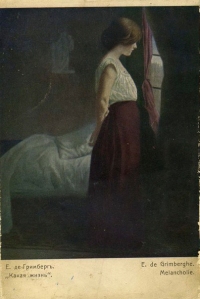 1944: Poesías, prologue by Luisa Luisi Motevideo, Claudio García & Co.
1944: Poesías, prologue by Luisa Luisi Motevideo, Claudio García & Co.
1971: Poesías completas, prólogue and notes by Manuel Alvar, Barcelona: Editorial Labor
Alfonsina Storni, an Argentinian writer and poet of Italian descent, commited suicide by walking into the sea (the Mar del Plata) in 1938, a year after the suicide of her close friend and fellow writer, the Uruguayan/Argentinan (both countries claim him) Horacio Quiroga. She had been suffering from breast cancer. There are many articles on her work and life to be found on the web. This is a link to the Britannica thumbnail listed under her name.
http://www.britannica.com/EBchecked/topic/567660/Alfonsina-Storni
Félix Luna is listed in Wikipedia as “a prominent Argentine writer, lyricist and historian.” Luna was born on September 30th 1925, Happy Birthday five hours from now Mr. Luna.
I don’t know how coincidences occur, but when I decided to post a couple of poems by Delmira Agustini today, I was led to a tribute to her written by Alfonsina Storni. From there I was led to the poem dedicated to Storni written by Félix Luna. I then found the poem had been set to music by Ariel Ramírez, and found the beautiful version of the song sung by Mercedes Sosa.

